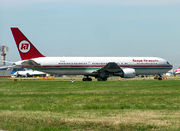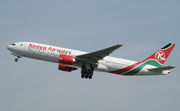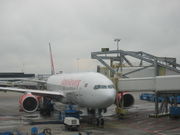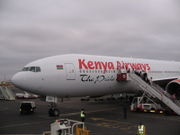Kenya Airways
 |
||||
|
||||
| Founded | 1977 | |||
|---|---|---|---|---|
| Hubs | Jomo Kenyatta International Airport | |||
| Focus cities | Moi International Airport | |||
| Frequent-flyer program | Flying Blue | |||
| Member lounge | Simba Lounge | |||
| Alliance | SkyTeam | |||
| Fleet size | 27[1] (+ 9 orders) | |||
| Destinations | 46 | |||
| Company slogan | "The Pride of Africa" | |||
| Headquarters | Embakasi, Nairobi, Kenya | |||
| Key people | Titus Naikuni (CEO) Alex Mbugua (CFO) Evanson Mwaniki (Chairman) |
|||
| Website | www.kenya-airways.com | |||
Kenya Airways is the flag carrier and largest airline of Kenya. The company was founded in 1977, and it started operations on February 4, 1977. It is based in Embakasi, Nairobi,[2][3] with its main base at Jomo Kenyatta International Airport.[4] From there, it operates 46 scheduled services throughout Africa, Europe and Asia, including the Indian subcontinent, using a fleet of 27 airplanes.
Contents |
History
Kenya Airways was established in February 1977 following the break-up of the East African Community and the consequent demise of East African Airways[5]. Up until April 1996 it was owned by the Kenyan government.
In 1986, Sessional Paper Number 1 was published by Kenya's government, outlining the country's need for economic development and growth. The document stressed the government opinion that the airline would be better off if owned by private interests, thus resulting in the first attempt to privatize the airline. The government named Philip Ndegwa as Chairman of the Board in 1991, with specific orders to privatize the airline. In 1992, the Public Enterprise Reform paper was published, giving Kenya Airways priority among national companies in Kenya to be privatized.

In the fiscal year 1993 to 1994, the airline produced its first profit since the start of commercialization. Also, in 1994, the International Finance Corporation (IFC), was appointed to provide assistance in the privatization process. In 1995, Kenya Airways restructured its debts and a made a master corporation agreement with KLM that bought 26% of the shares in Kenya Airways and became the largest single shareholder. In 1996, shares were floated to the public, and the airline started trading on the Nairobi Stock Exchange. In October 2004, the company cross-listed its shares at the Dar-es-Salaam Stock Exchange. In April 2004, the company re-introduced Kenya Airways Cargo as a brand and in July 2004, the company's domestic subsidiary Flamingo Airlines was re-absorbed.

In 2005, Kenya Airways changed its livery. The four stripes running the length of the fuselage were replaced by the slogan "Pride of Africa". The "KA" tail logo was replaced by a styled "K" encircled with a "Q" to evoke the "KQ" call letters for the airline. In 6 months ending on 30 September 2005, profits after tax rose 48% vs. 2004-5 to Kshs 2.231 billion (US$30 million) and over 1.2 million passengers were carried.
In the full-year results ending 31 March 2005, profits after tax almost tripled over 2003-4 to Kshs 3.882 Billion (US$50 million) and over 2 million passengers were carried.
Kenya Airways announced record profit growth for 2005-06. After-tax profits increased from 3.88 billion Kenya shillings (about US$54 million) to 4.83 billion shillings.[6]
In March 2006, Kenya Airways won the "African Airline of the Year" award for 2005, for the fifth time in seven years.[7]:22
Passenger numbers in the year 2006 (April 2006 – March 2007) was a record high of 2.6 million.[8]
On September 4, 2007, SkyTeam, the second-largest airline alliance in the world, welcomed Kenya Airways as one of the first official SkyTeam Associate Airlines.[9]

The airline is owned by individual Kenyan shareholders (30.94%), KLM (26%), the Kenyan government (23%), Kenyan institutional investors (14.2%), foreign institutional investors (4.47%) and individual foreign investors (1.39%).[10] It has 2,408 employees (at March 2007). Kenya Airways also owns 49% of Precision Air in Tanzania.[4]
Destinations
Kenya Airways codeshares with KLM and Air France, giving passengers access to European destinations including Glasgow, Athens, Zurich, Birmingham, Manchester, Madrid, Berlin, Frankfurt, Barcelona, Rome,Copenhagen and Stockholm. The codeshare agreement meant that direct Kenya Airways services to the latter three were discontinued. Services to Seoul are provided via codeshare agreements with Korean Air. Kenya Airways commenced two new routes to Zimbabwe in addition to the daily flight to Harare from Nairobi. The airline now flies to Bechehombe and Nyinisvinu south of Zimbabwe.
Fleet

As of May 2010, the Kenya Airways fleet consists of 27 aircrafts:[11]
| Aircraft | Total | Orders | Passengers (Premier World/Economy) |
|---|---|---|---|
| Boeing 737-300 | 4 | 116 (16/100) | |
| Boeing 737-700 | 4 | 116 (16/100) | |
| Boeing 737-800 | 5 | 145 (16/129) | |
| Boeing 767-300ER | 7 | 216 (20/196) | |
| Boeing 777-200ER | 4 | 322 (28/294) | |
| Boeing 787-8 | 9[12] | ||
| Embraer 170LR | 3 | 72 (0/72) | |
| Total | 27 | 9 |
The average fleet age of Kenya Airways in May 2010 was 8.7 years.[13]
- In 2004, the airline took delivery of three Boeing 767-300 Extended Range 216-seater aircraft and acquired two Boeing 737-700 jets with blended winglets. Another two B767-300 were leased in February and March from GECAS and the Airbus A310 fleet retired.
- In 2006, Kenya Airways ordered six Boeing 787 Dreamliners and plans to replace its Boeing 767s with the Dreamliners, beginning with the delivery of two aircraft in 2010, and four in 2011.[14]
- As stated in a November 11, 2009 press release, Kenya Airways has leased a newer 767-300ER to replace an older version. The new aircraft reg. 5Y-KYY will have 20 business class seats (55" pitch) and 215 economy (32" pitch) seats.[15]
Services
Entertainment
- Boeing 777-200ER
Premier World entertainment on the Boeing 777 is AVOD (Audio Video on Demand). It includes around 10 to 15 movies and T.V shows. Economy class has NVOD as entertainment which is almost the same as AVOD. In Premier World there is a choice of which movie to watch at any time. Both classes include 12 audio channels that work throughout the flight.
- Boeing 767-300ER
The Boeing 767-300ER has personal televisions in all classes. Both classes have 11 TV channels with stereo sound. Unlike on the Boeing 777, Boeing 767 TVs are not on demand. Channels are in French and English. Both classes also have 8 channels of audio.
- Boeing 737-800
The Boeing 737-800 has overhead screens in all cabins and they both have 8 channels of audio throughout the flight.
- Boeing 737-700
The Boeing 737-700 has overhead screens in all cabins and they both have 8 channels of audio throughout the flight.
- Boeing 737-300
The Boeing 737-300 has background music playing throughout the flight.
Incidents and accidents
- On 31 January 2000 the airline suffered its first fatal accident when Kenya Airways Flight 431, an Airbus A310, crashed into the Atlantic Ocean after takeoff from Abidjan, Côte d'Ivoire, killing 169 of the 179 people on board.
- On 5 May 2007, Kenya Airways Flight 507, a Boeing 737-800, crashed 5.4 kilometers southeast of Douala International Airport in a mangrove swamp[16], after taking off for Nairobi. The flight originated in Abidjan, with a stopover in Douala to pick up passengers. The plane was carrying 105 passengers from 26 countries and 9 crew members. All perished in the incident. Rescue efforts were hampered by the difficult terrain around the crash site and unpleasant weather conditions.
References
- ↑ "Fleet Information". Kenya Airways. http://www.kenya-airways.com/home/about_kenya_airways/our_fleet/default.aspx. Retrieved 1/7/10.
- ↑ "Privacy Policy." Kenya Airways. Retrieved on 14 February 2010.
- ↑ "Kenya." Kenya Airways. Retrieved on 2 May 2010.
- ↑ 4.0 4.1 "Directory: World Airlines". Flight International: p. 100. 2007-04-03.
- ↑ "History". Kenya Airways. http://www.kenya-airways.com/kqdispinfo.aspx?colm=69. Retrieved 6 July 2010.
- ↑ "Business in Africa". Business in Africa. http://www.businessinafrica.net/news/east_africa/464202.htm.
- ↑ "to view the 2005/06 Financial - kq annual report layout 2006 / 2". Kenya Airways. http://www.kenya-airways.com/kq4/uploadedFiles/Global_Website/Information_and_Services/Archives/Investor_Information/2005-06%20annual%20report.pdf. Retrieved 6 July 2010.
- ↑ Kenya Airways: 2006/07 Year end results March 31, 2007
- ↑ Kenya Airways: SkyTeam strengthens global network with addition of three Associate Airlines September 4, 2007
- ↑ Kenya Airways: Kenya Airways Shareholder Profile March 31, 2006
- ↑ "Our Fleet". Kenya Airways. http://www.kenya-airways.com/home/about_kenya_airways/our_fleet/default.aspx. Retrieved 5 July 2010.
- ↑ "Boeing – Customer Summary". Boeing. http://active.boeing.com/commercial/orders/index.cfm?content=displaystandardreport.cfm&pageid=m25064&RequestTimeout=20000. Retrieved 5 July 2010.
- ↑ airfleets.net – Kenya Airways Fleet Age 10 June 2010
- ↑ Boeing – Kenya Airways to Add Boeing 787 Dreamliners 06 March 2006
- ↑ Kenya Airways: Kenya Airways increases aircraft fleet 11 November 2009
- ↑ flightglobal.com – Investigators trawl swamps 15 July 2007
External links
|
|||||||||||||||||||||||||||||||||||||||||||||||||||||||||||||||||||||||||||||||||||||||||||||||||||||||||||||||